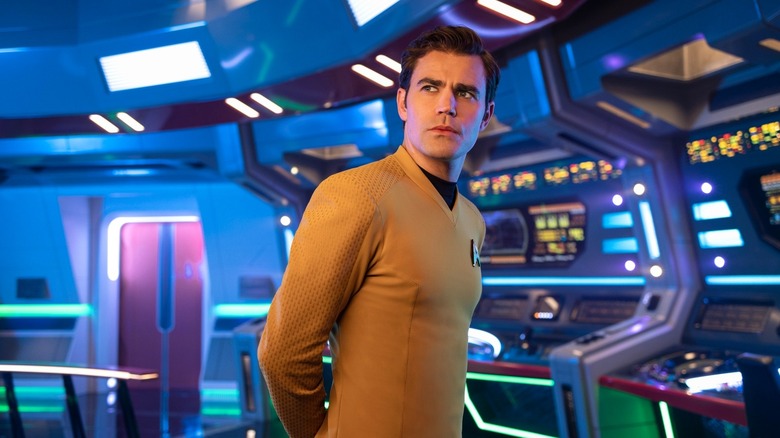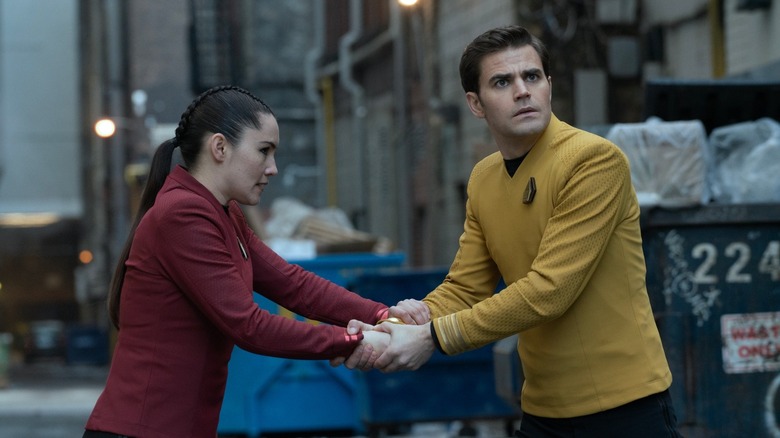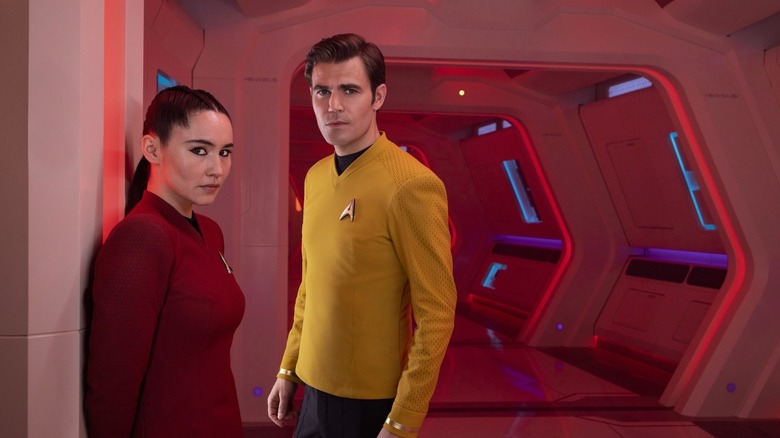Star Trek: Strange New Worlds' Paul Wesley Didn't Want To Play A Canon Version Of Kirk
This post contains spoilers through the second season's third episode of "Star Trek: Strange New Worlds."
At the very end of the first season of "Star Trek: Discovery," the denizens of the title ship, ready to jet into the cosmos on a five-year mission, were unexpectedly greeted by the U.S.S. Enterprise coming the other way. Because "Discovery" takes place about a decade before the events of the original "Star Trek" series, this was a U.S.S. Enterprise commanded by Captain Christopher Pike, the character from the original "Star Trek" pilot. Pike (Anson Mount) and a few other notable legacy characters played a large part in the second season of "Discovery."
Those characters were popular enough to warrant a spin-off of their own, and now the world is merrily enjoying the second season of "Star Trek: Strange New Worlds."
Time, however, is creeping inexorably closer to the original "Star Trek," and more and more familiar characters are beginning to appear. Uhura (Celia Rose Gooding) is already an ensign at this point, while Spock (Ethan Peck), Nurse Chapel (Jess Bush), and Dr. M'Benga (Babs Olunamokun) are all in place for their eventual Enterprise posts, arranged in the appropriate places for when James T. Kirk eventually takes command.
And yes, now James T. Kirk (Paul Wesley) is also part of the show. In the second season of "Strange New Worlds," it appears that Kirk will make several appearances as both himself and as alternate timeline versions of himself. Wesley does a wonderful job capturing the character's confidence and slight smugness as established by actor William Shatner back in the 1960s. Wesley, however, was keen to make the character his own, and, in a roundtable discussion that /Film's Vanessa Armstrong attended, declared that his Kirk was going to be "non-canonical."
First, the canonical part
Remaining "non-canonical" on "Star Trek" may be freeing as an actor, but may raise the hackles of longtime Trekkies. Trekkies, it should be noted, have long been sticklers for canon, and one might even argue that they invented the very concept.
Paul Wesley talked about how he observed Kirk in the "Star Trek" episode "Balance of Terror," which was heavily referenced in the first season "Worlds" episode, "A Quality of Mercy." He also scrubbed through several other episodes and found what parts of Kirk should definitely remain a part of his performance. Notably, he found that Kirk was a very moral person with an unflappable ethical code. That part was to remain canonical. Wesley said:
"[T]he season 1 finale is based on 'Balance of Terror,' which is quite a ... I watched that episode multiple times and Kirk is fairly serious. Then as you watch [the original series], there are moments where he's incredibly playful, and I think every episode speaks to a different characteristic and quality that Kirk has. And I think season 2, episode 3 was very playful, but also the one through line is that he's very heroic and he has a really good moral compass and he always trusts his instincts. I think that is the pillar and that's something that is not movable, I guess, so to speak."
Season 2, episode 3 of "Strange New Worlds" saw an alternate timeline version of Kirk and Lieutenant Noonien-Sigh (Christina Chong) thrown back in time to 21st-century Toronto. Like "Star Trek IV: The Voyage Home," the episode is loaded with fish-out-of-water humor, and Wesley gets to be extremely playful.
Now, the non-canonical part
Later in the discussion, however, Paul Wesley added that his version of Kirk is certainly not the version played by William Shatner. Importantly, this Kirk is about eight years younger, and still needs to accrue a great deal of command experience; one cannot become a moral and even-headed captain without being a captain first. As such, the younger Commander Kirk is going to behave differently and even have different ways of speaking and gesticulating. Wesley implied that he might begin to incorporate "Shatner-isms" as the character continues to develop, but that Shatner's particular acting style will not be a part of Wesley's yet. He said:
"I think it would be a mistake to automatically be that version of the Kirk that is part of the canon and that we know. I think he's still trying to figure himself out and I think part of the fun of playing this character pre the Kirk that we all know is to slowly evolve and to slowly develop the mannerisms or characteristics or the cadence. I think that we can slowly get there, and I think if we get there from day one, it's a little bit less interesting to watch. I wanted to keep it a little bit unique and different."
Wesley's version of Kirk is also mercifully kept off-screen for the bulk of the season, relegated instead to occasional guest star. Pike is the captain of the Enterprise, and the show's ensemble is already interesting enough — and already populated by legacy characters — that Kirk shouldn't be necessary. By the end of Pike's five-year mission, and his forthcoming disaster (oh me, oh my!), Kirk will be ready to take command, and "Strange New Worlds" can link directly into the events of "Where No Man Has Gone Before" (September 22, 1966).


